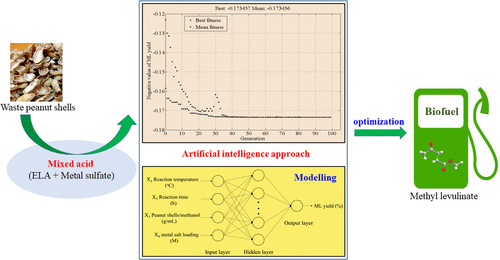当前位置:
X-MOL 学术
›
Energy Fuels
›
论文详情
Our official English website, www.x-mol.net, welcomes your
feedback! (Note: you will need to create a separate account there.)
Efficient Catalytic Conversion of Waste Peanut Shells into Liquid Biofuel: An Artificial Intelligence Approach
Energy & Fuels ( IF 5.2 ) Pub Date : 2020-01-30 , DOI: 10.1021/acs.energyfuels.9b03433 Pan Li 1 , Zeji Du 1 , Chun Chang 1 , Shiqiang Zhao 2 , Guizhuan Xu 3 , Chunbao Charles Xu 4
Energy & Fuels ( IF 5.2 ) Pub Date : 2020-01-30 , DOI: 10.1021/acs.energyfuels.9b03433 Pan Li 1 , Zeji Du 1 , Chun Chang 1 , Shiqiang Zhao 2 , Guizhuan Xu 3 , Chunbao Charles Xu 4
Affiliation

|
Artificial intelligence approach can be used to solve complicated process problems. A hybrid methodology comprising artificial neural network (ANN) and genetic algorithms (GA) was utilized to model and optimize the methanolysis process of waste peanut shells. Acid catalytic methanolysis of waste peanut shells into liquid biofuel-methyl levulinate (ML) was investigated. The combination of sulfuric acid with extremely low concentration and Al2(SO4)3 was identified as the efficient mixed acid catalytic system. The ML yield under optimal conditions optimized by response surface methodology (RSM) was 16.49%, while the ML yield optimized by ANN–GA was 17.61%. The results showed that ANN–GA had a higher optimizing ability than the RSM model. Meanwhile, the methanolysis kinetics provided insights into the reaction routes for ML production. Moreover, Al2(SO4)3 can be recycled and reused five times without much decrease of the ML yield. This study suggested that waste peanut shells can be used as potential raw materials for ML production and ANN–GA can serve as a powerful tool for biofuel processing technology.
中文翻译:

花生壳高效催化转化为液态生物燃料的人工智能方法
人工智能方法可用于解决复杂的过程问题。利用包括人工神经网络(ANN)和遗传算法(GA)的混合方法对废花生壳的甲醇分解过程进行建模和优化。研究了废花生壳的酸催化甲醇分解成液体生物燃料-乙酰丙酸甲酯(ML)。极低浓度的硫酸和Al 2(SO 4)3的组合被认为是有效的混合酸催化体系。通过响应面法(RSM)优化的最佳条件下的ML产率为16.49%,而通过ANN-GA优化的ML产率为17.61%。结果表明,ANN–GA比RSM模型具有更高的优化能力。同时,甲醇分解动力学提供了对ML生产反应路线的见识。而且,Al 2(SO 4)3可以循环使用五次而不会降低ML收率。这项研究表明,废花生壳可以用作生产ML的潜在原料,而ANN-GA可以作为生物燃料加工技术的有力工具。
更新日期:2020-01-31
中文翻译:

花生壳高效催化转化为液态生物燃料的人工智能方法
人工智能方法可用于解决复杂的过程问题。利用包括人工神经网络(ANN)和遗传算法(GA)的混合方法对废花生壳的甲醇分解过程进行建模和优化。研究了废花生壳的酸催化甲醇分解成液体生物燃料-乙酰丙酸甲酯(ML)。极低浓度的硫酸和Al 2(SO 4)3的组合被认为是有效的混合酸催化体系。通过响应面法(RSM)优化的最佳条件下的ML产率为16.49%,而通过ANN-GA优化的ML产率为17.61%。结果表明,ANN–GA比RSM模型具有更高的优化能力。同时,甲醇分解动力学提供了对ML生产反应路线的见识。而且,Al 2(SO 4)3可以循环使用五次而不会降低ML收率。这项研究表明,废花生壳可以用作生产ML的潜在原料,而ANN-GA可以作为生物燃料加工技术的有力工具。











































 京公网安备 11010802027423号
京公网安备 11010802027423号